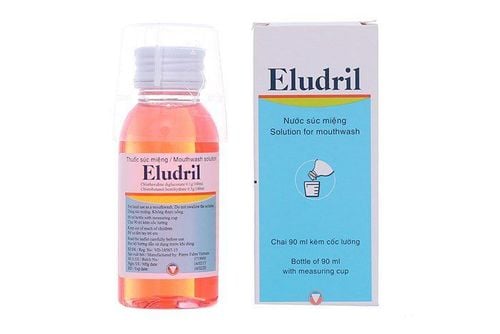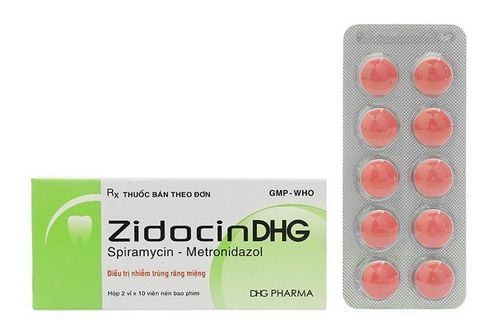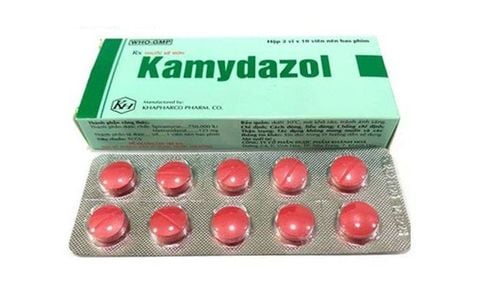This is an automatically translated article.
Article written by MSc Lai Do Quyen - Doctor of Dentistry - Maxillofacial - Facial, Interspecialty Department - Vinmec Times City International General Hospital
Bad breath makes you confused, embarrassed, is a big barrier that makes you lack confidence in communication, living, participating in social activities and expressing emotions every day. It can be said that bad breath is the reason ranked only after tooth decay and periodontal disease that causes patients to visit the dentist. To identify bad breath is not difficult. However, the perception of bad breath varies from person to person and from culture to culture. Having a full understanding of bad breath will help you be proactive in preventing it.
1. What is bad breath?
Halitosis is a term used to describe bad breath. Bad breath can occur at any age, from children to the elderly. Bad breath increases slightly with age, with age, bad breath increases. The prevalence of bad breath in men and women is almost the same.
2. How to identify bad breath
Identifying bad breath is not difficult, including the following ways:
Manual method: feel your mouth has a bad odor yourself or when you put your palm to your mouth, exhale and then smell your palm, smell the mask After wearing... Family members or medical examiners confirm that you have bad breath. Measure by machine.
3. Causes of bad breath
The main cause of bad breath is due to the release of volatile sulfur compounds in the oral cavity. These volatile sulfur compounds are thought to be produced by proteolytic anaerobic Gram-negative bacteria.
These bacteria always exist in the mouth, concentrated in the periodontal pockets (gum pockets), the surface of the tongue, the interstitial area between the teeth. They break down proteins found in food debris, bacteria, ulcer waste, etc. in the mouth and cause odors.
Here are the causes of bad breath:
3.1 Causes of oral origin
Is the main cause of bad breath, mostly due to infections in the oral cavity. Including:
Diseases of the teeth such as caries, root canals, pus holes with fistulas in the apex... Inflammatory diseases of the periodontal area such as gingivitis, periodontitis, necrotizing gingivitis, periodontitis , inflammation around the implant ...
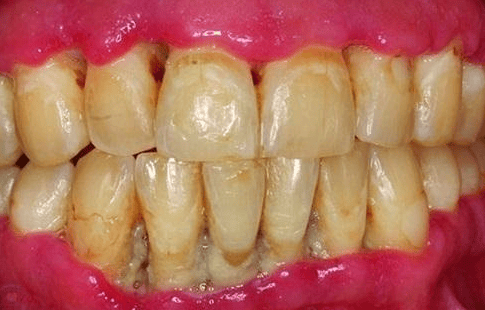
Nha chu viêm
Tartar, plaque. Oral ulcers such as viral sores, malignant ulcers in the mouth, drug-induced ulcers, infectious mechanical sores, hand-foot-and-mouth disease, gonorrhea, AIDS.
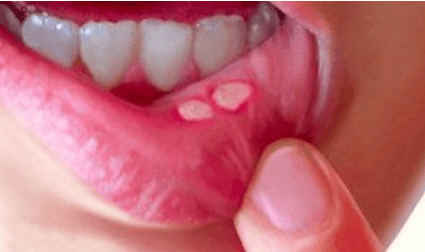
Vết loét Aphthous
Inflammatory diseases of the tongue such as candida glossitis, glossitis...
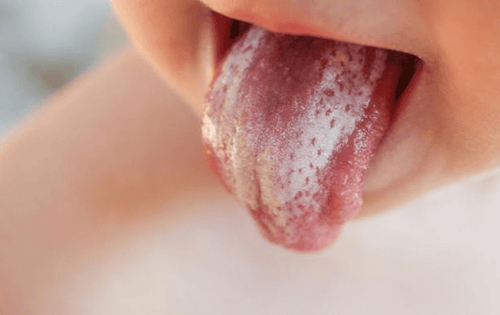
Nấm lưỡi
Diseases of the jawbone such as alveolar osteomyelitis, osteomyelitis, osteonecrosis, bone cancer... Decreased saliva production due to underactive salivary glands, salivary gland inflammation, age, medication, cord paralysis facial nerve (VII), radiotherapy, chemotherapy, Sjogren's syndrome. Poor oral hygiene creates a thick layer of tongue residue, a lot of food stuck in the crevices and interstitial spaces in the mouth. The deposition of food debris, tartar in exposed crown bridges, in excess fillings, in dentures, orthodontic appliances...
3.2 Causes of extra-oral origin
Accounts for about 10-15% of the causes of bad breath. Including:
Dry mouth due to mouth breathing, smoking, drinking alcohol, taking medicine, drinking less water, the body is dehydrated. Nasopharyngeal diseases such as purulent Amidales, sinusitis, oropharyngeal infections.
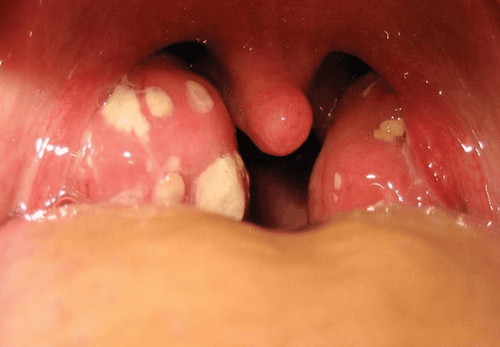
Viêm Amidale hốc mủ
Inflammation of the respiratory tract. Gastrointestinal diseases such as belching, pylorus, gastroesophageal reflux. Diabetes, liver failure, kidney failure. Trimethylaminuria-Fish Odor Symdrome: is a very rare syndrome, caused by a disorder in the metabolism of Trimethylamin in fishy foods. An autoimmune disease in infants. Due to drug use: some drugs cause odor when taken, especially cancer treatment drugs. Bad breath will go away without taking the medicine. Smoking: Smokers have the most common and most recognizable bad breath. The smell of tobacco can last longer than a day after stopping smoking. Due to food: foods with a lot of protein, fat, foods derived from milk, alcohol, foods that cause odors such as onions, garlic, shrimp paste... Bad breath is caused by metabolism between certain foods. Eating and drinking produces volatile fatty acids and other foul-smelling substances that are excreted by the lungs. Bad breath in the mouth resembles the smell of used food and occurs only temporarily after eating. Psychological: Psychological bad breath is rare. Patients feel that they have severe bad breath, so they often isolate themselves and avoid people. Psychogenic bad breath is often seen in women, or patients with mental illnesses such as depression, schizophrenia...

Ợ hơi là nguyên nhân gâ hôi miệng
4. Dentist's advice to get rid of bad breath
Halitosis is completely curable if you know the exact cause and then have the right treatment. For cases of pathology, the definitive treatment or control of the disease is the most important factor to limit or eliminate bad breath such as: filling cavities, replacing bridges, open-margin crowns, treatment of diseases of the periodontal area and infections in the mouth, treatment of diseases of the nose and throat, treatment, control and maximum limitation of complications of systemic diseases.
Daily clean oral hygiene also plays an important role in limiting or completely eliminating bad breath. Brush teeth properly with toothpaste and floss to remove all food debris in the mouth. Using a water flosser is also a way to remove stubborn food particles stuck in between teeth or around bridges and crowns. Clean your tongue gently after every brushing with the bristles of the toothbrush. Brushing the tongue with a tongue scraper should be avoided because it is easy to damage the surface of the tongue. Drink enough water to avoid dry mouth. Avoid drinking too much alcohol. Limit progress towards quitting smoking. Eat lots of fruits and vegetables. Limit your intake of meat and fats. Avoid foods that can cause bad breath in your mouth. Use mouthwash, spray, lozenges, or chew gum to reduce bad breath. However, these ways only cover the effect, not an effective way to treat bad breath. Actively go to the dentist for early treatment of diseases in the mouth and get tartar every 6 months.
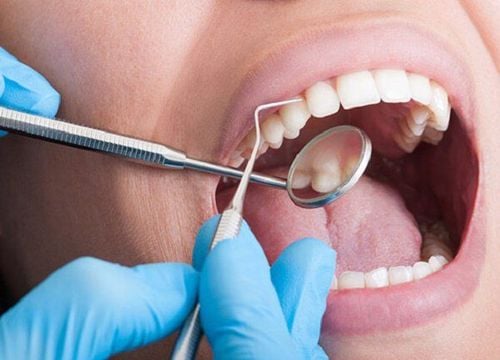
Lấy cao răng định kỳ giúp ngăn ngừa hôi miệng
Halitosis is a fairly common problem, encountered in all ages and greatly affects communication, work and daily activities. To keep the mouth odor-free depends a lot on the sense of personal hygiene, the sense of health protection and the habits of each person.
You and us - the dentists of Vinmec Times City International Hospital, let's join hands to raise the awareness of good oral hygiene so that you always have fresh natural breath.
Vinmec is a system of General Hospital for intensive examination and treatment, well-coordinated, so in addition to dental care, we can treat and control other diseases that cause bad breath other than the mouth to give you peace of mind. treatment.
Customers can go directly to Vinmec Times City to visit or contact hotline 0243 9743 556 for support.




